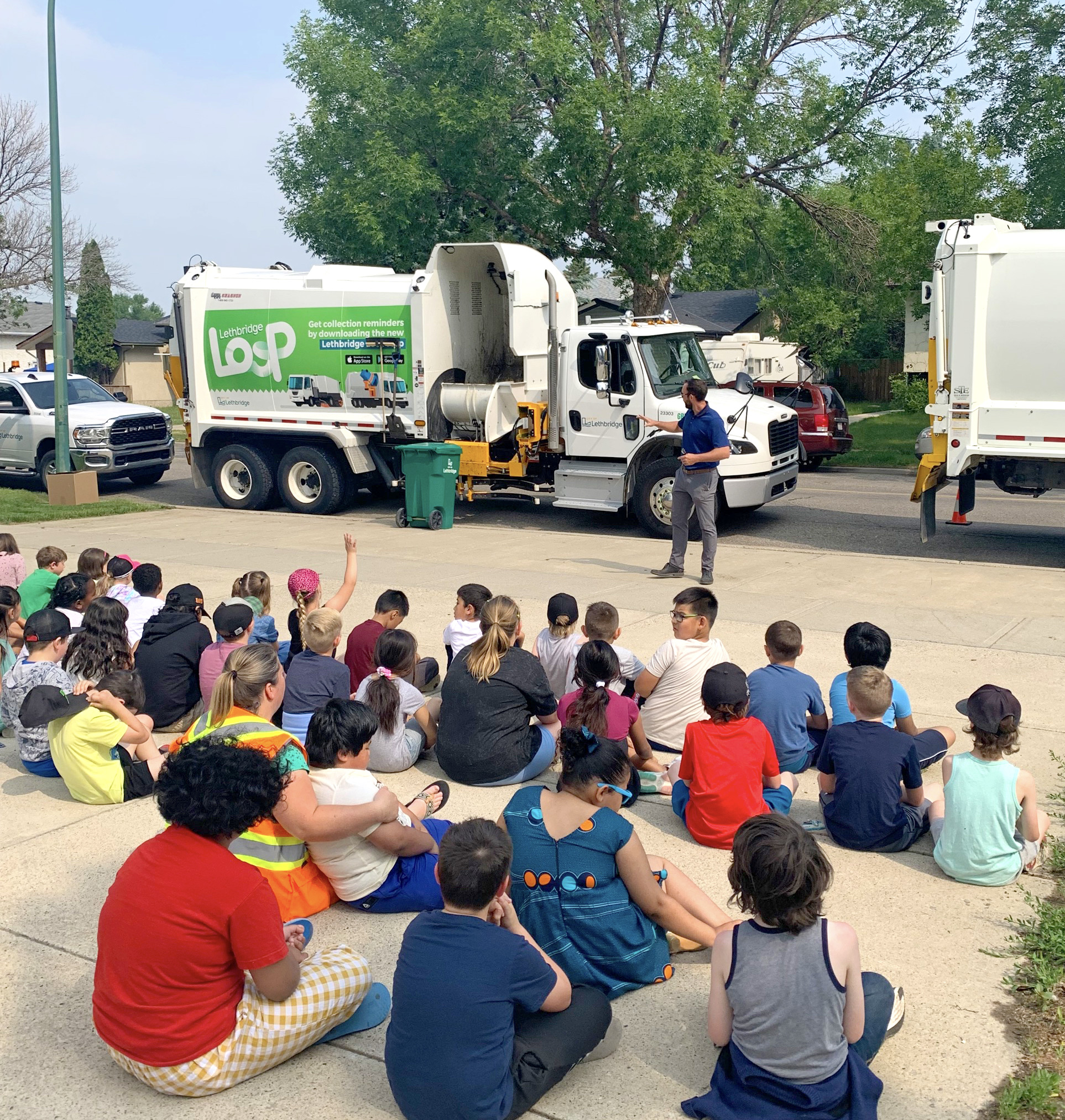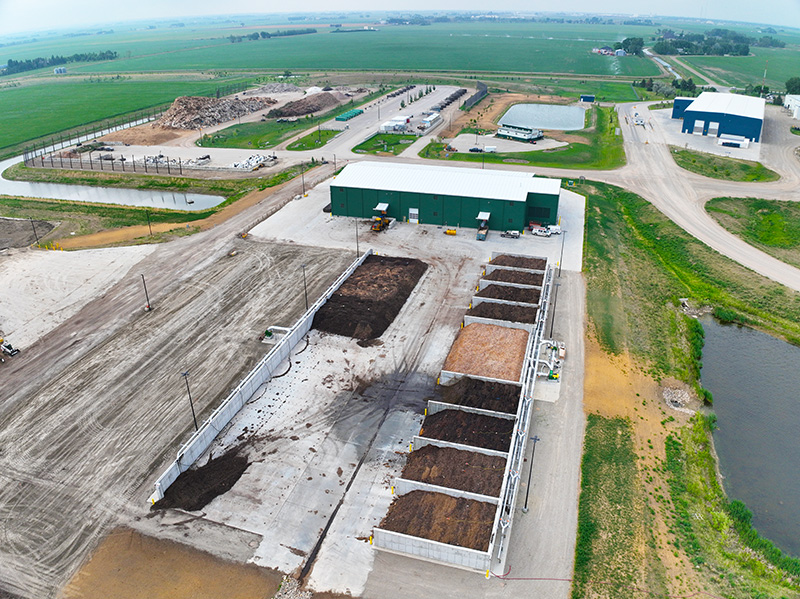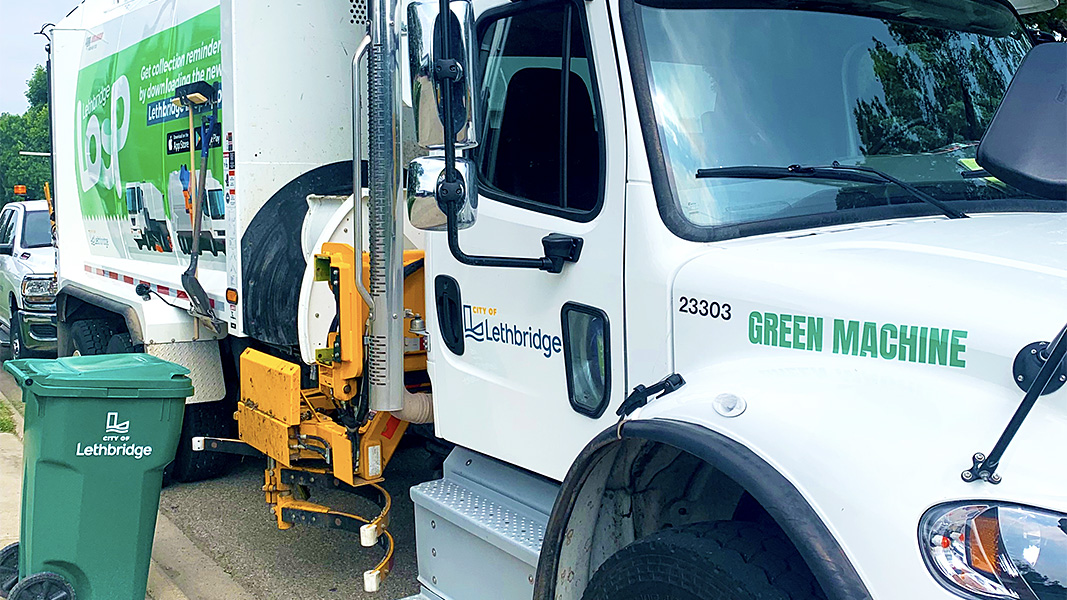Top: Lethbridge organics carts are collected weekly from May through October, and then biweekly from November through April. Photos courtesy City of Lethbridge
Nora Goldstein
The City of Lethbridge, Alberta is a latecomer to collection and composting of residential and commercial organics. One advantage of starting a program after many municipalities in Canada and the U.S. is there is a lot of knowledge and experience to tap. “It was a huge opportunity to engage with other municipalities to learn,” notes Steve Rozee, Processing Manager at the city’s Waste & Environment department. “For example, we decided to be a food and soiled paper only program, versus accepting items like certified compostable packaging and pet waste. Our municipal colleagues cited contamination as their greatest struggle, so our city opted to start with the basics and consider including other materials over time.”
The city (pop. 106,500) is the third largest in the province of Alberta. It provides trash, recycling, and organics collection service to 34,000 single-family households and about 7,500 multifamily housing units. Some multifamily units are serviced by private waste haulers. Lethbridge owns the Waste & Recycling Center, which opened as a private landfill in 1985. “We purchased the site in 2000 and began rebranding and retooling it as a waste and recycling center since 2010,” adds Rozee. “Single stream curbside recycling collection was started in 2019, and we built a materials recovery facility at the Center. The landfill has 50 to 100 years of capacity, but the driver for Lethbridge to launch curbside recycling and organics collection is conservation of the landfill space we have. Our goal is to divert 50% of municipal waste from landfill disposal, with a 2030 goal of 140 kg (308.6 lbs)/capita for the residential sector and 320 kg (705 lbs)/capita for the institutional/commercial/industrial (ICI) sector.”
Curbside Organics
Until the city rolled out curbside organics collection, residents had the option of self-hauling their yard trimmings to drop-off sites (3 in total). In 2021, just over 2,000 tons were collected and composted at the Waste & Recycling Center’s passively aerated windrow composting operation. Lethbridge also provided fall leaf collection in kraft paper bags, along with picking up Christmas trees.
Before rolling out organics collection citywide, logistics were tested in 2022 during the first phase of the project with 1,900 households in three different neighborhoods. The neighborhoods varied in terms of socioeconomics, tree cover, size of the roads and set out locations (e.g., front of house, lanes). The data were used to inform the number of households per route when full-scale organics collection was rolled out, staffing requirements, and education and outreach strategies. It was also decided to service the organics carts weekly from May through October, and then biweekly from November through April.
In April and May of 2023, all remaining single-family homes and semi-detached houses in Lethbridge received a green, 240-liter (64-gallon) cart. Collection began in mid-May. “Grass, leaves and branches up to 2 inches thick and 3-feet long go in the green cart, along with all food waste and soiled paper,” says Leslie Burke, the city’s Waste & Environment Community Initiatives & Education Specialist. “We also offered households paper bag liners for their countertop bins during our education and engagement events along with DIY origami paper liner instructions for the kitchen countertop bin.”
Apartments and condominiums that currently have communal/shared waste services will have organics collection implemented by the city on a one-by-one basis, with properties under 45 units starting to come online in fall of 2023. Locations with over 45 units will begin their implementation of organics collection in the spring of 2024. Residential participation in the green cart program is not mandatory, but households are charged a fee on their utility bill. As the program rolls out to multifamily households, they will be charged a mandatory fee as well. Residential customers in single family homes are charged $5/month and customers in a multi-family residence (apartment/condo) who receive communal collection are charged $4/month on their utility bill. The FAQ page on the Lethbridge curbside organics webpage explains that the monthly fee covers part of the following costs: Composting facility operations (maintenance, utilities, staffing); curbside collection of green carts; compost marketing; maintenance and lifecycle for collection trucks and carts; and resources for public education and outreach.
Households have the option to downsize their black trash cart and receive a reduced fee on the black and green cart service. Residents who currently have a 360-liter (95-gallon) black cart could downsize to a 240-liter cart after June 1, 2023, saving around $1.71 on their monthly utility bill.
Education And Outreach
Community engagement has been a cornerstone of the curbside organics collection program rollout. For example, school children in Lethbridge participated in a contest to name the new organics collection trucks, as well as the existing trash and recycling trucks. More than 500 entries competed to be selected for the name of a truck. The students named four garbage trucks, four recycling trucks and six organics trucks. Winning names for the organics vehicles are Haulin’ Grass, The Bin-Credible Hulk, Professor Organical, Worm’s Delite, Binderella and Green Machine.

Lethbridge school children participated in a contest to name the new organics collection trucks, as well as existing garbage and recycling vehicles.
An animated video series, ‘Curbside Enthusiasm,’ also was created, offering residents short, entertaining videos to ease anticipated resident concerns about the new green cart. The seven-episode series shares tips and tricks about using the carts, including how to manage bin odors, what is allowed in the cart, how to line the kitchen bin with newspaper, and more. “Households that participated in the pilot program [Phase 1] provided feedback about their experience which helped to shape the city-wide rollout, including our outreach and education materials,” explains Meagan Williams, Communications & Engagement Strategist. “We also held a month-long contest to encourage residents to try the bin and tied that into the Curbside Enthusiasm animated videos. We knew from the outset that getting people to do something new would be challenging, so incentivizing the program with a contest made the change more appealing.”
Since the rollout, adds Williams, more than 85% of residents are setting their green cart out at different frequencies. “On a weekly basis, about half the carts are set out which we know is for a number of reasons,” she says. “For instance, we encourage people not to set out their carts if they’re not full as the wind in the city can be something else. Partially empty carts are at risk of being pushed around the neighborhood. So far, a good portion of residents are only putting in green waste which means they’ve heard the messaging about what can and cannot go into their green bin. Now we just need them to add their expired foods and food waste to it more often.”
To learn more about household behavior and use of the cart, Lethbridge hired ‘oops taggers’ for the summer months to check the carts on collection days. “We are tagging green carts that have visible contamination, to let the residents know what’s not acceptable, but still collecting the material,” notes Burke. “We did this last year during the first phase of the project as well. Because we are seeing mostly yard waste in the green cart, we are planning additional social marketing to address the ‘ick factor’. This is likely dampening the addition of food waste to the cart.”
Composting Facility Upgrade
Integral to Lethbridge’s organics collection program was to upgrade its organic waste receiving and composting infrastructure. Engineered Compost Systems (ECS) was selected to collaborate with Tetratech Engineering to design a solution that would fit on the site, could be expanded over time, and work well in extreme cold temperatures. The composting facility, with capacity to process 22,000 tons/year of organics, uses ECS’ reverse aeration system in bunkers for active composting. The design reverses and recirculates the air flow, enabling heat recovery and faster composting during cold weather conditions. Fresh piles are covered with a ‘biolayer’ made of screened overs. A biofilter treats odors when the aeration system operates in the negative mode.

Lethbridge’s upgraded organic waste receiving and composting site has capacity to process 22,000 tons/year of organics.
The secondary composting step uses below grade positive aeration to further stabilize the material. There are a total of eight reversing aeration bunkers and 10 positive aeration bunkers. Retention time in each phase is 22 days. The city anticipates producing about 14,300 tons of compost annually once the facility is operating at scale. There will be some compost giveaway events for residents, but it is expected that the majority of product will be sold to soil blenders and landscape depots. “We’re also working with a company to make a fertilizer product as southern Alberta is the ‘breadbasket’ of Canada,” says Rozee. “There is a lot of irrigated farmland in that region.” Compost also will be used in City parks.

The city anticipates producing about 14,300 tons of compost annually once the facility is operating at scale.
The organics receiving building has two tipping areas — one for the residential organics stream and the other for ICI organics. Capacity is split about 60:40 between the ICI and residential streams, respectively. Residential organics are processed in a slow-speed shredder to create a uniform size and consistency, then mixed as needed with ground wood waste before being loaded into a bunker.
The ICI organics side is equipped to receive packaged and unpackaged food waste streams. The city purchased a Tiger depackager in anticipation of servicing generators in both Lethbridge and the surrounding area. “The tipping fee at the composting facility is about half the fee at the landfill for commercial organics,” says Rozee. “It’s a significant cost savings to tip at our new facility.” The ICI generators in the city — about 2,900 in all — are required to separate their organics for composting.
The curbside organics project, including construction of the facility, cost $10,629,000 (Cdn). The Government of Canada’s Community-Building Fund provided $5,879,000 for facility construction and the Government of Alberta provided $4,750,000 from the Municipal Sustainability Initiative to support the curbside organics program.













